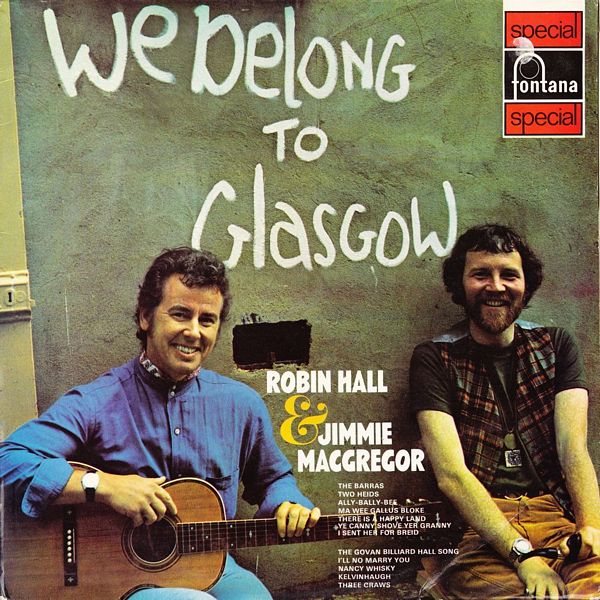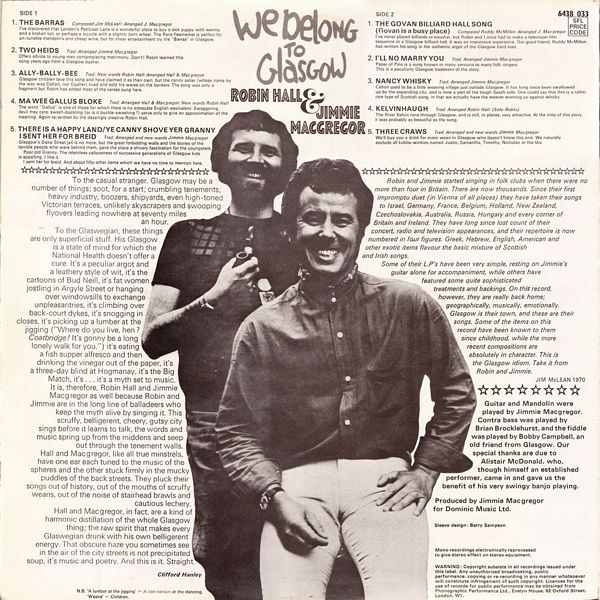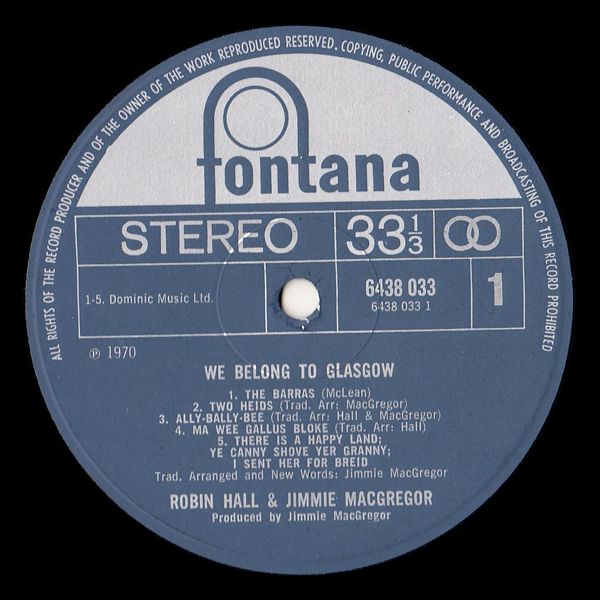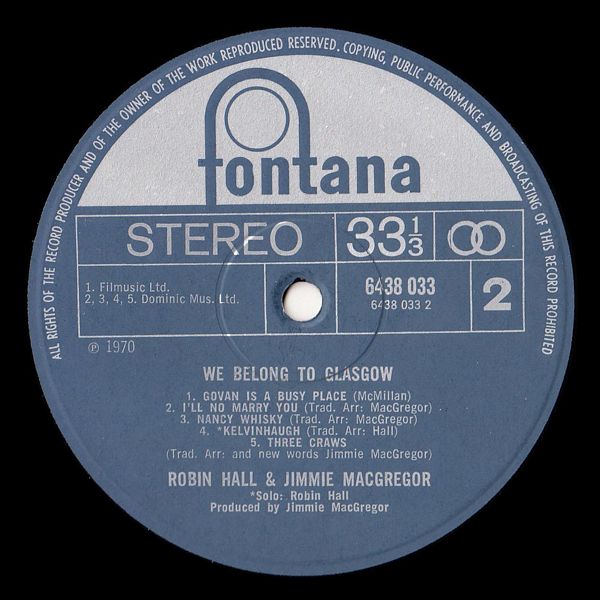

 |



|
Sleeve Notes
THE BARRAS — I've discovered that London's Petticoat Lane is a wonderful place to buy a sick puppy with worms and a broken tail, or perhaps a bicycle with a slightly bent wheel. The Paris fleamarket is perfect for un-tunable mandolins and cheap wine, but for sheer entertainment try the "Barras" in Glasgow.
TWO HEIDS — Offers advice to young men contemplating matrimony. Don't! Robin learned this song years ago from a Glasgow busker.
ALLY-BALLY-BEE — Glasgow children love this song and have claimed it as their own, but the candy seller (whose name by the way was Coltart, not Coulter) lived and sold his wares on the borders. The song was only a fragment but Robin has added most of the verses sung here.
MA WEE GALLUS BLOKE — The word "Gallus" is one of those for which there is no adequate English equivalent. Swaggering, devil may care, swash-buckling (or is it buckle-swashing?) serve only to give an approximation of the meaning. Again re-written by the dazzingly creative Robin Hall.
THERE IS A HAPPY LAND, YE CANNY SHOVE YER GRANNY?, I SENT HER FOR BREID — Trad. Arranged and new words Jimmie Macgregor Glasgow's Duke Street jail is no more, but the great forbidding walls and the stories of the terrible people who were behind them, gave the place a shivery fascination for the youngsters. Poor old Granny. The relentless callousness of successive generations of Glasgow kids is appalling. I like it. I sent her for breid. And about fifty other items which we have no time to mention here.
THE GOVAN BILLIARD HALL SONG (Govan is a busy place) — I've never played billiards or snooker, but Robin and I once had to make a television film sequence in a Glasgow billiard hall. It was an Impressive experience. Our good friend, Roddy McMillan has written his song in the authentic argot of the Glasgow hard man,
I'LL NO MARRY YOU — Paper of Pins is a song known in many versions to many folk-singors. This a peculiarly Glasgow treatment of the story.
NANCY WHISKY — Calton used to be a little weaving village just outside Glasgow. It has long since boon swallowed up by the expanding city, and is now a part of the tough South side. One could say that this a rather rare type of Scottish song, in that we actually have the weaver warning us against whisky.
KELVINHAUGH (Solo — Robin) — The River Kelvin runs through Glasgow, and is still, in places, very attractive. At the time of this story, it was probably as beautiful as the song.
THREE CRAWS — We'll buy you a drink for every wean in Glasgow who doesn't know this one. We naturally exclude all kiddie-winkies named Justin, Samantha, Timothy, Nicholas or the like.
To the casual stranger. Glasgow may be a number of things; soot, for a start; crumbling tenements; heavy industry, boozers, shipyards, even high-toned Victorian terraces, unlikely skyscrapers and swooping flyovers leading nowhere at seventy miles an hour.
To the Glaswegian, these things are only superficial stuff. His Glasgow is a state of mind for which the National Health doesn't offer a cure. It's a peculiar argot and a leathery style of wit, it's the cartoons of Bud Neill, it's fat women jostling in Argyle Street or hanging over windowsills to exchange unpleasantries, it's climbing over back-court dykes, it's snogging in closes, it's picking up a lumber at the jigging ("Where do you live, hen?
Coatbridge! It's gonny be a long lonely walk for you.") it's eating a fish supper alfresco and then drinking the vinegar out of the paper, it's a three-day blind at Hogmanay, it's the Big Match, it's … it's a myth set to music.
It is, therefore, Robin Hall and Jimmie Macgregor as well because Robin and Jimmie are in the long line of balladeers who keep the myth alive by singing it. This scruffy, belligerent, cheery, gutsy city sings before it learns to talk, the words and music spring up from the middens and seep out through the tenement walls.
Hall and Macgregor, like all true minstrels, have one ear each tuned to the music of the spheres and the other stuck firmly in the mucky puddles of the back streets. They pluck their songs out of history, out of the mouths of scruffy weans, out of the noise of stairhead brawls and cautious lechery.
Hall and Macgregor, in fact, are a kind of harmonic distillation of the whole Glasgow thing; the raw spirit that makes every Glaswegian drunk with his own belligerent energy. That obscure haze you sometimes see in the air of the city streets is not precipitated soup, it's music and poetry. And this it. Straight.
Clifford Hanley
N.B. 'A lumber at the jigging' = A cononnion at the dancing. 'Weans' = Children.
Robin and Jimmie started singing in folk clubs when there were no more than four in Britain. There are now thousands. Since their first impromptu duet (in Vienna of all places) they have taken their songs to Israel, Germany, France, Belgium, Holland, New Zealand, Czechoslovakia, Australia, Russia, Hungary and every corner of Britain and Ireland. They have long since lost count of their concert, radio and television appearances, and their repertoire is now numbered in four figures. Greek, Hebrew, English, American and other exotic items flavour the basic mixture of Scottish and Irish songs.
Some of their L.P's have been very simple, resting on Jimmie's guitar alone for accompaniment, while others have featured some quite sophisticated treatments and backings. On this record, however, they are really back home; geographically, musically, emotionally.
Glasgow is their town, and these are their songs. Some of the items on this record have been known to them since childhood, while the more recent compositions are absolutely in character. This the Glasgow idiom. Take it from Robin and Jimmie.
JIM McLEAN, 1970
Guitar and Mandolin were played by Jimmie Macgregor. Contra bass was played by Brian Brocklehurst, and the fiddle was played by Bobby Campbell, an old friend from Glasgow. Our special thanks are due to Alistair McDonald, who, though himself an established performer, came in and gave us the benefit of his very swingy banjo playing.